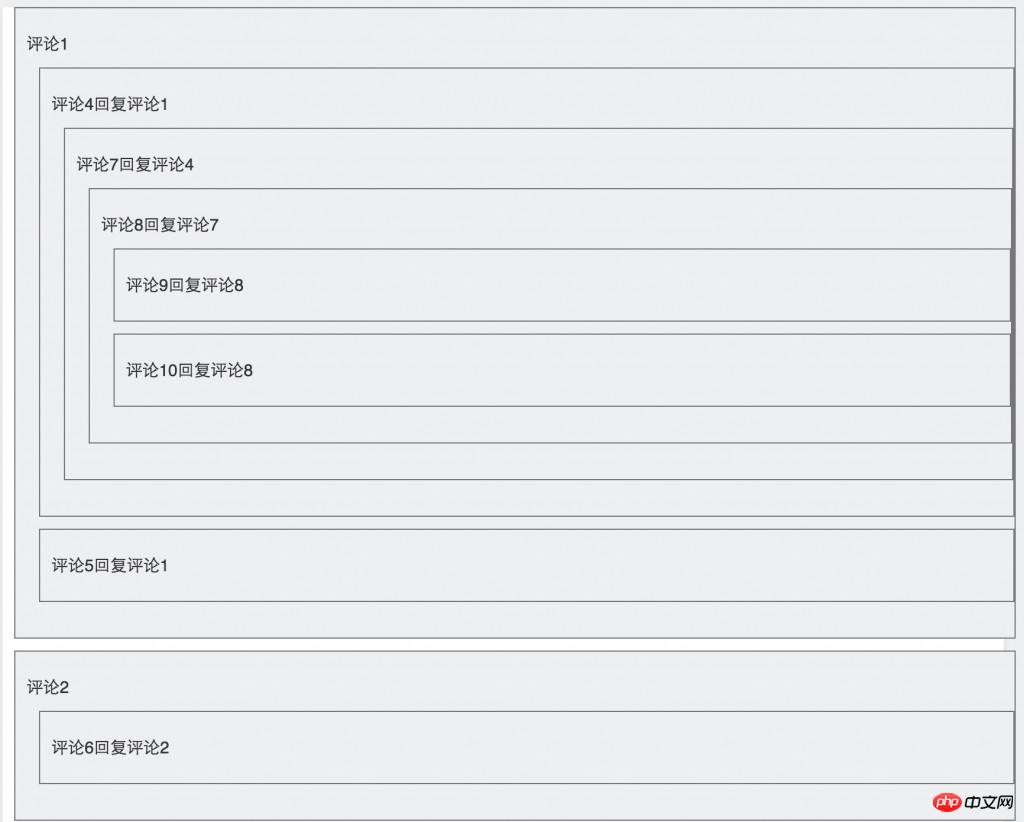 Backend Development
Backend Development
 PHP Tutorial
PHP Tutorial
 Detailed explanation of the function of implementing website message board in PHP
Detailed explanation of the function of implementing website message board in PHP
Detailed explanation of the function of implementing website message board in PHP
This article mainly introduces how to implement the website message board function in PHP. It is mainly modeled on the Changyan message board and NetEase post styles. Interested friends can refer to it. I hope to be helpful.
What I want to achieve is the style shown below. You can refer to the message boards of the two websites below. Their implementation principles are the same
Chang Message board style:

NetEase post style:

##PrincipleYou need to add two main fields, id and pid, to the comment table. Other fields can be added at will, such as article id, reply time, and reply. Content, responders, etc.
The pid is the ID of the comment that has been replied to currently.
As you can see from the picture above, the pid of each layer is the id of the comment on the previous layer. Take a closer look at the layout above. Is it very similar to multidimensional arrays in PHP? If you can think of it, it's easy.
Implementation method
1. Front desk: This is relatively simple, it is p embedded in p. Then set the border and margin padding of p
<p class="comment"> <p class="comment"> <p class="comment"> </p> </p> </p> <p class="comment"> </p>
2. Backstage: Two recursions are used. First, recursion is used to reorganize the results in the database. After reorganization, then use recursion to output the above front-end code
comment table structure and content are as follows

Array ( [0] => Array ( [id] => 1 [pid] => [content] => 评论1 ) [1] => Array ( [id] => 2 [pid] => [content] => 评论2 ) [2] => Array ( [id] => 3 [pid] => [content] => 评论3 ) [3] => Array ( [id] => 4 [pid] => 1 [content] => 评论4回复评论1 ) [4] => Array ( [id] => 5 [pid] => 1 [content] => 评论5回复评论1 ) [5] => Array ( [id] => 6 [pid] => 2 [content] => 评论6回复评论2 ) [6] => Array ( [id] => 7 [pid] => 4 [content] => 评论7回复评论4 ) [7] => Array ( [id] => 8 [pid] => 7 [content] => 评论8回复评论7 ) [8] => Array ( [id] => 9 [pid] => 8 [content] => 评论9回复评论8 ) [9] => Array ( [id] => 10 [pid] => 8 [content] => 评论10回复评论8 ) )
where $array is the array read above, first take out the pid which is empty by default. Then recurse, after taking out the array whose pid is the current comment id
public static function tree($array,$child="child", $pid = null)
{
$temp = [];
foreach ($array as $v) {
if ($v['pid'] == $pid) {
$v[$child] = self::tree($array,$child,$v['id']);
$temp[] = $v;
}
}
return $temp;
}Array
(
[0] => Array
(
[id] => 1
[pid] =>
[content] => 评论1
[child] => Array
(
[0] => Array
(
[id] => 4
[pid] => 1
[content] => 评论4回复评论1
[child] => Array
(
[0] => Array
(
[id] => 7
[pid] => 4
[content] => 评论7回复评论4
[child] => Array
(
[0] => Array
(
[id] => 8
[pid] => 7
[content] => 评论8回复评论7
[child] => Array
(
[0] => Array
(
[id] => 9
[pid] => 8
[content] => 评论9回复评论8
[child] => Array
(
)
)
[1] => Array
(
[id] => 10
[pid] => 8
[content] => 评论10回复评论8
[child] => Array
(
)
)
)
)
)
)
)
)
[1] => Array
(
[id] => 5
[pid] => 1
[content] => 评论5回复评论1
[child] => Array
(
)
)
)
)
[1] => Array
(
[id] => 2
[pid] =>
[content] => 评论2
[child] => Array
(
[0] => Array
(
[id] => 6
[pid] => 2
[content] => 评论6回复评论2
[child] => Array
(
)
)
)
)
[2] => Array
(
[id] => 3
[pid] =>
[content] => 评论3
[child] => Array
(
)
)
)public static function traverseArray($array)
{
foreach ($array as $v) {
echo "<p class='comment' style='width: 100%;margin: 10px;background: #EDEFF0;padding: 20px 10px;border: 1px solid #777;'>";
echo $v['content'];
if ($v['child']) {
self::traverseArray($v['child']);
}
echo "</p>";
}
}
Related recommendations:
Detailed explanation of how PHP displays hexadecimal image data to the web page
Detailed explanation of ThinkPHP's behavior extensions and plug-ins
##Detailed explanation of how PHP implements a simple search box automatic prompt function
The above is the detailed content of Detailed explanation of the function of implementing website message board in PHP. For more information, please follow other related articles on the PHP Chinese website!

Hot AI Tools

Undresser.AI Undress
AI-powered app for creating realistic nude photos

AI Clothes Remover
Online AI tool for removing clothes from photos.

Undress AI Tool
Undress images for free

Clothoff.io
AI clothes remover

Video Face Swap
Swap faces in any video effortlessly with our completely free AI face swap tool!

Hot Article

Hot Tools

Notepad++7.3.1
Easy-to-use and free code editor

SublimeText3 Chinese version
Chinese version, very easy to use

Zend Studio 13.0.1
Powerful PHP integrated development environment

Dreamweaver CS6
Visual web development tools

SublimeText3 Mac version
God-level code editing software (SublimeText3)

Hot Topics
 1664
1664
 14
14
 1421
1421
 52
52
 1315
1315
 25
25
 1266
1266
 29
29
 1239
1239
 24
24
 Explain JSON Web Tokens (JWT) and their use case in PHP APIs.
Apr 05, 2025 am 12:04 AM
Explain JSON Web Tokens (JWT) and their use case in PHP APIs.
Apr 05, 2025 am 12:04 AM
JWT is an open standard based on JSON, used to securely transmit information between parties, mainly for identity authentication and information exchange. 1. JWT consists of three parts: Header, Payload and Signature. 2. The working principle of JWT includes three steps: generating JWT, verifying JWT and parsing Payload. 3. When using JWT for authentication in PHP, JWT can be generated and verified, and user role and permission information can be included in advanced usage. 4. Common errors include signature verification failure, token expiration, and payload oversized. Debugging skills include using debugging tools and logging. 5. Performance optimization and best practices include using appropriate signature algorithms, setting validity periods reasonably,
 Explain late static binding in PHP (static::).
Apr 03, 2025 am 12:04 AM
Explain late static binding in PHP (static::).
Apr 03, 2025 am 12:04 AM
Static binding (static::) implements late static binding (LSB) in PHP, allowing calling classes to be referenced in static contexts rather than defining classes. 1) The parsing process is performed at runtime, 2) Look up the call class in the inheritance relationship, 3) It may bring performance overhead.
 What are PHP magic methods (__construct, __destruct, __call, __get, __set, etc.) and provide use cases?
Apr 03, 2025 am 12:03 AM
What are PHP magic methods (__construct, __destruct, __call, __get, __set, etc.) and provide use cases?
Apr 03, 2025 am 12:03 AM
What are the magic methods of PHP? PHP's magic methods include: 1.\_\_construct, used to initialize objects; 2.\_\_destruct, used to clean up resources; 3.\_\_call, handle non-existent method calls; 4.\_\_get, implement dynamic attribute access; 5.\_\_set, implement dynamic attribute settings. These methods are automatically called in certain situations, improving code flexibility and efficiency.
 PHP and Python: Comparing Two Popular Programming Languages
Apr 14, 2025 am 12:13 AM
PHP and Python: Comparing Two Popular Programming Languages
Apr 14, 2025 am 12:13 AM
PHP and Python each have their own advantages, and choose according to project requirements. 1.PHP is suitable for web development, especially for rapid development and maintenance of websites. 2. Python is suitable for data science, machine learning and artificial intelligence, with concise syntax and suitable for beginners.
 PHP in Action: Real-World Examples and Applications
Apr 14, 2025 am 12:19 AM
PHP in Action: Real-World Examples and Applications
Apr 14, 2025 am 12:19 AM
PHP is widely used in e-commerce, content management systems and API development. 1) E-commerce: used for shopping cart function and payment processing. 2) Content management system: used for dynamic content generation and user management. 3) API development: used for RESTful API development and API security. Through performance optimization and best practices, the efficiency and maintainability of PHP applications are improved.
 PHP: A Key Language for Web Development
Apr 13, 2025 am 12:08 AM
PHP: A Key Language for Web Development
Apr 13, 2025 am 12:08 AM
PHP is a scripting language widely used on the server side, especially suitable for web development. 1.PHP can embed HTML, process HTTP requests and responses, and supports a variety of databases. 2.PHP is used to generate dynamic web content, process form data, access databases, etc., with strong community support and open source resources. 3. PHP is an interpreted language, and the execution process includes lexical analysis, grammatical analysis, compilation and execution. 4.PHP can be combined with MySQL for advanced applications such as user registration systems. 5. When debugging PHP, you can use functions such as error_reporting() and var_dump(). 6. Optimize PHP code to use caching mechanisms, optimize database queries and use built-in functions. 7
 PHP vs. Python: Understanding the Differences
Apr 11, 2025 am 12:15 AM
PHP vs. Python: Understanding the Differences
Apr 11, 2025 am 12:15 AM
PHP and Python each have their own advantages, and the choice should be based on project requirements. 1.PHP is suitable for web development, with simple syntax and high execution efficiency. 2. Python is suitable for data science and machine learning, with concise syntax and rich libraries.
 Explain the match expression (PHP 8 ) and how it differs from switch.
Apr 06, 2025 am 12:03 AM
Explain the match expression (PHP 8 ) and how it differs from switch.
Apr 06, 2025 am 12:03 AM
In PHP8, match expressions are a new control structure that returns different results based on the value of the expression. 1) It is similar to a switch statement, but returns a value instead of an execution statement block. 2) The match expression is strictly compared (===), which improves security. 3) It avoids possible break omissions in switch statements and enhances the simplicity and readability of the code.



